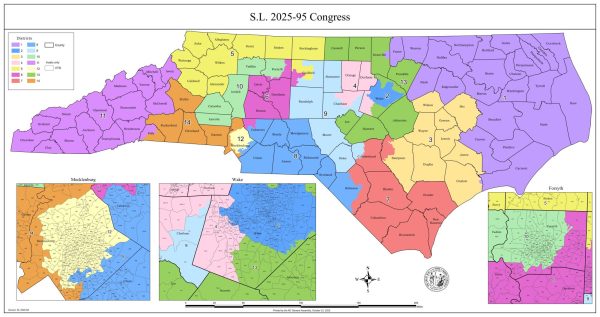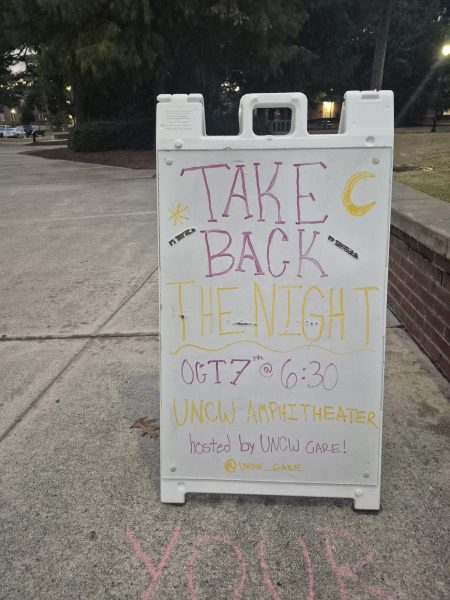What happens to the victims of sexual assault after the assault
UNCW reported a total of three forcible sex offenses last year, but one in five college women are victims of completed or attempted sexual assault, according to a study by the National Institute for Justice.
Every university deals with sexual assault and harassment cases differently-at Amherst, one student’s journey from victim to survivor was plagued by the university, and she eventually dropped out. When it happens at UNCW, what are the victim’s options?
Who should know?
At UNCW, victims must be careful of who they tell. Under the new Title IX policy for all universities, faculty and staff are required to report anything they hear about violations of the sexual misconduct policy to the dean of students.
However, there are three offices on campus that victims can report to confidentially: the student health center, the student counseling center and CARE, UNCW’s Collaboration for Assault Response and Education office. If the victim reports to these offices, information will only go to the dean of students if the victim wants it to.
“CARE works out of what we call an ’empowerment model,'” said Rebecca Caldwell, director of CARE. “Our role is to lay out the options the student has in the most non-judgmental way we can.”
The student can then report it to local police, campus police, both or neither.
“It is important that they know that they have a right to file a police report, and the college will support them in that,” Caldwell said. “That they know they can use the college conduct system and that they are encouraged to make that choice.”
What help is available?
According to Caldwell, crimes of sexual assault are methods used by attackers to strip a victim of their power and control.
Getting that power and control back is a hard road to walk alone. This is where CARE comes in.
CARE is UNCW’s resource for relationship education and violence prevention. They provide services relating to relationship abuse, sexual assault, stalking and harassment. CARE services include 24-hour crisis response; confidential consultations by walk-in or appointment; crisis counseling; advocacy within the medical, law enforcement and court systems; and educational programming.
Students can utilize confidential services through CARE, the student health center and the student counseling center for both physical and emotional care.
“We need to ensure that we are an environment free of harassment and that when harassment occurs, we respond to it appropriately,” said Michael Walker, dean of students and Title IX designee in a presentation given to a women’s studies class a few weeks ago.
What does the school do?
In an email Walker said it is imperative that university provide appropriate remedies for victims of harassment, including offering a campus conduct process, connected students to external resources (criminal justice system), internal resources (CARE), and orders of no contact with their assailants. When appropriate, changes in residence hall assignments and classes can be utilized to protect students from further harassment or retaliation. However, if the assault is not reported to the police, either on campus or local,it can be difficult to to charge the assailant through the campus conduct process. Except in certain circumstances, even if the student reports the incident to campus police, the assailant may continue in classes until the university makes a decision (or unless the assailant is arrested).
In most cases, it’s left to the victim to change classes and residence.
The campus conduct process is run by the office of the dean of students. If a campus investigation results in a student charged under the sexual misconduct policy, then the university enacts a conduct board process. This typically results in the assailant being removed from UNCW. But that doesn’t mean the assailant can’t come back.
In the email Walker said campus judicial sanctions are meant to be educational. For example, somebody who gets put out of the UNCW system has a property right to come back if they have done the things they need to do. But the university will always attempt to ensure if a student who has been suspended returns to campus that there is no safety risk for other students, Walker said.
The victim’s choice to report to either UNCW or local police is crucial.
The campus conduct system and the criminal justice system off campus differ in their standards for evidence required to prove an assault happened. The standard for evidence is lower in the campus conduct system than the criminal justice system. This makes it more likely to prove that an alleged event on campus actually occurred instead of deciding “beyond a reasonable doubt” an assault happened.
Once Walker is notified of the incident, a meeting is scheduled between him and the victim. The victim, if he or she chooses, is provided a victim advocate from CARE to attend this meeting. The meeting essentially determines whether the attack requires further investigation, and whether the victim chooses to move forward with the process.
Some situations do require a more in-depth investigation, said Walker.
Assaults that pose an on-going safety risk to any community member, such as those involving use of force or a weapon, may result in a summary suspension whereby the subject is immediately removed from campus and the conduct process follows later.
What does the new policy do?
In April 2011, the Office of Civil Services determined sexual misconduct to be an issue of Title IX.
This new policy puts more pressure on the university to prove that they did everything in their power to restore the victim to a prior status. This is to make sure the student is offered such things as counseling and medical attention.
“What they’re saying is that a single act of sexual misconduct has such a significant impact that it can affect whether a student can stay in school and maintain an equal educational opportunity,” Caldwell said.
While the policy offers new rights to university students, it can also diminish the victim’s choice. The opportunity to exercise a victim’s right to choice is essential to CARE, and in some ways this new policy could jeopardize that freedom.
Students might feel intimidated when confiding in a UNCW faculty or staff member, because that trusted adult is required to report any sexual misconduct to the dean of students whether the student wants to report it or not.
“This is about [the student] being guaranteed the rights that they are owed, but I think, in the moment, it may not feel that way as a victim,” Caldwell said.
Amy Schlag, women’s studies instructor and program coordinator for LBGTQIA at UNCW, said if she senses a student is about to confide in her about an alleged sexual assault, she informs them before letting them continue that she will be required to report any sexual misconduct to Walker.
Why do so few report?
Sexual assault is the most under-reported crime in the criminal justice system. The majority of sexual assaults, 63 percent, are not reported to the police according to a 2002 U.S. Department of Justice publication by Callie Marie Rennison.
There are several factors that cause the low percentage of reports. The legal process has proved traumatizing for the victim, who is required to relive their sexual assault countless times in their testimony. There is also a distrust of the legal system, with only one in five cases going to trial and even fewer cases resulting in convictions.
While Caldwell notes that CARE never has and never will discourage a student from taking criminal action against their assailant, the office does not want to set up a student to have unrealistic expectations of the system.
“More importantly we are focused on laying out the options and being advocates, so the student has the best chances of getting the best outcome from the system,” Caldwell said.
Social stigma also contributes to low reporting. Victims will often blame themselves for the incident, especially if there is alcohol involved. According to Dean Walker, most of the sexual assault cases that have been brought to him during his time here are alcohol-related. But if the victim or assailant violated the alcohol policy during the course of an assault, the university is going to focus on the bigger issue, Walker said.
“We might have a discussion with the individual about the implications of drinking underage, but that is not where the university’s primary focus will be.”
What is consent?
The term “consent” is one that most students are not educated about prior to coming to college, and they come to campus not having a clear understanding of it.
According to Walker, the university defines “consent” as explicit approval demonstrated by clear actions or words. Dean Walker emphasized in his presentation that intoxication is not an excuse or a form of consent and that consent is not obtained by pressure of injury or incapacitation.







